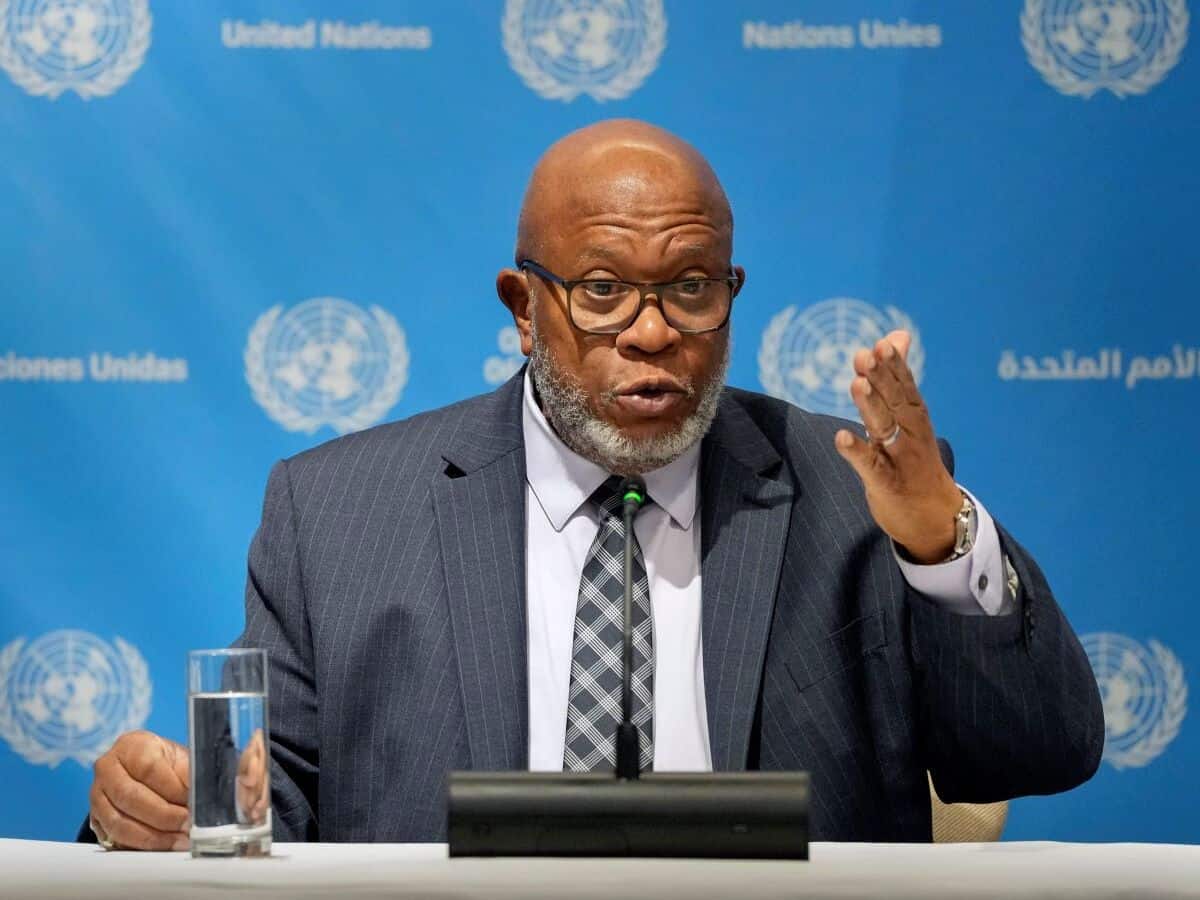
New Delhi: The situation in the Red Sea is “extremely disturbing” and it has the potential to escalate further, President of UN General Assembly Dennis Francis said on Wednesday. At a media interaction, Francis cautioned against “regionalisation” of the conflict, adding a “third World War is not beyond the realm of possibility.”
The president of the UN General Assembly, who is on a five-day visit to India, also strongly pitched for reform of the UN Security Council, saying its present composition does not reflect contemporary geopolitical realities.
Francis complimented India’s call for a two-State solution to the conflict in Gaza, describing New Delhi’s position as “highly responsible, pragmatic, sensible and necessary”.
On the situation in the Red Sea, Francis said it is “extremely disturbing”.
“That is an extremely disturbing situation. It would appear that third parties are facilitating this action being taken by the Houthis in the Red Sea — very damaging and very dangerous,” he said.
“Because the last thing you really want is the regionalisation of that war. You do not want that because that would mean escalation and escalation breeds further escalation. So, a Third World War is not beyond the realm of possibility,” he said.
The top UN diplomat held “comprehensive talks” with External Affairs Minister S Jaishankar covering a wide-range of issues including the situation in Gaza, the conflict in Ukraine, India’s engagement with the UN and UN Security Council reform.
“So glad to welcome @un_pga Dennis Francis this afternoon in New Delhi. His positive sentiments for our G20 Presidency and Voice of Global South Summits were notable. They have strengthened multilateralism,” Jaishankar said on ‘X’.
“Appreciated his position on need for urgency of reforms in international institutions especially the UN Security Council,” he said.
On the situation in Gaza, Francis said it is very worrying, adding that “peace peace is the only way”.
The geopolitical realities of today are not reflected in the Council, he said.
On reforms of the UN Security Council, he said it is “inescapable”.
“The fact of the matter is that the Council in recent years has been progressively unable to take the decisions to assist and support strengthening of international peace and security largely for geopolitical reasons,” he said.
Asked about India’s aspirations to become a permanent member of the UN Security Council, Francis said the country is a highly respected member of the UN.
“It (India) is a leader in many ways. And I am sure that that fact is not lost on the members of the General Assembly,” he said.
Francis said global dynamics of geopolitics often get into the functioning of the UN Security Council and that results invariably in the use of veto-power by one or the other party.
“Often this causes immense frustration in the general assembly but also beyond. The reform of the UN Security Council is absolutely necessary. I do not think there is any member of the United Nations that would deny that,” he said.
Explaining the delay in rolling out the much needed reforms, he appeared to blame the five permanent members of the top global body.
“If you are in a privileged position, you are not in a hurry to lose privileges. I think it is well appreciated that the existing formula is woefully inadequate,” he said.
“The reform is inescapable. The question is what would be the formula for undertaking the reform,” he added.
India has been pressing for reform of the United Nations, especially the UN Security Council. New Delhi has been particularly upset over lack of any meaningful movement forward in the Intergovernmental Negotiations (IGN) on Security Council reform.
India is a strong contender for a permanent membership at the UN Security Council.
At present, the UNSC comprises five permanent members and 10 non-permanent member countries which are elected for a two-year term by the General Assembly of the UN.
The five permanent members are Russia, the UK, China, France and the United States and these countries can veto any substantive resolution.
The President of the UN General Assembly also hailed India for its role in making the African Union a full member of the G20.
“There is no doubt in anyone’s mind that India’s outreach to Africa particularly with regard to its facilitating the membership of the African Union in the G20 demonstrates India’s leadership in the international arena,” he said.
“But more than that it demonstrated India’s long-standing commitment to assist and facilitate development in the Global South,” Francis added.
Belonging to the diplomatic service of Trinidad and Tobago, Francis has announced his presidency priorities to include peace, prosperity, progress and sustainability.
The theme of his Presidency of the 78th UNGA is ‘Rebuilding trust and reigniting solidarity.’
